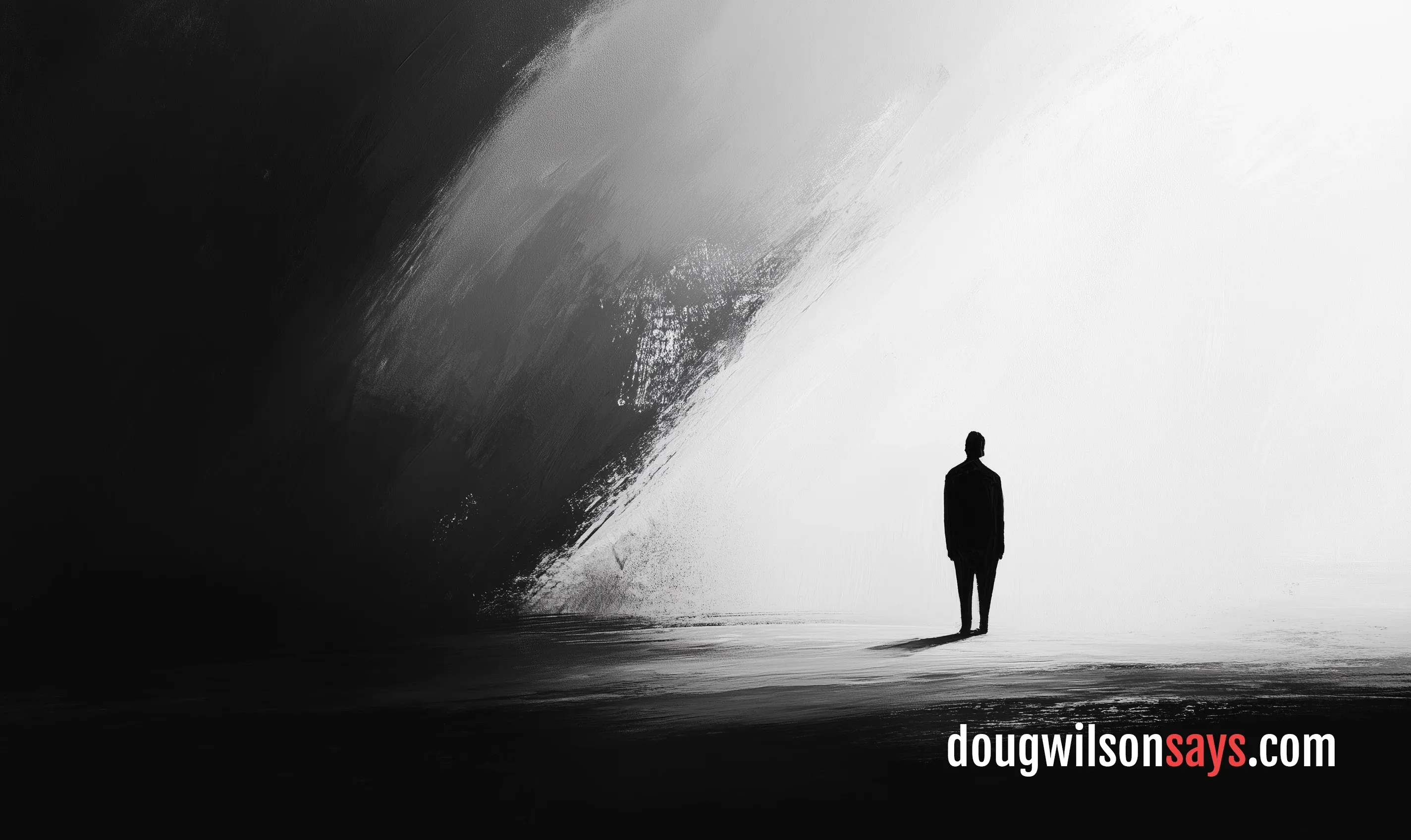Doug Wilson Says Read My Theology Book with a ‘Willing Suspension of Disbelief’ Because ‘Wouldn’t It Be Glorious If This Really Were True?’

“So here is my proposal…read this little book as though it were a work of fiction. Just for a short while, I am asking for that willing suspension of disbelief. And if that request is granted, then I believe that a striking feature of this kind of historical optimism will become plain. Every Christian can agree on one thing at least. Wouldn’t it be glorious if this really were true?”1 —Doug Wilson
OPINION: This quote is from Doug’s theology book, Heaven Misplaced: Christ’s Kingdom on Earth where he argues for his theocratic postmillennial view of eschatology. Asking readers of a theological work to suspend disbelief2—even one on eschatology—is more than just bad advice; it flies in the face of what Scripture commands. Rather than suspend our disbelief, we are instructed to: “…examine everything carefully; hold fast to that which is good;” (1 Thessalonians 5:21, NASB95) and “…do not believe every spirit, but test the spirits to see whether they are from God, because many false prophets have gone out into the world” (1 John 4:1, NASB95).
By encouraging readers to suspend disbelief, Doug is again inadvertently promoting eisegesis,3 the practice of reading one’s own ideas into Scripture. This contrasts with exegesis,4 which involves drawing meaning directly from the text itself. In this particular case, we see Doug’s desire for historical optimism—a “winner” theology rather than a “loser” theology.5 But when we bring our personal desires or preconceived ideas to the Bible, we risk distorting its true message.
Even though Doug admits that “if it is not true, then it doesn’t matter how lovely it is.”6 He appears to overlook how this approach sets up himself and his readers to come to God’s Word with preconceived ideas that may obscure the truth. Instead of asking his readers to suspend disbelief while he interprets Scripture in ways that are “unfamiliar”7 to the reader, Doug should be urging them to engage even more deeply with Scripture to see if what he teaches is true. When someone advocates for an interpretation that is different from what is commonly accepted among believers, that is not the time to lower our defenses—it is the time to strengthen them by weighing the view carefully against the whole counsel of God’s Word.
Why am I making a big deal about this, especially when it’s a quote regarding a tertiary element of faith like eschatology? For multiple reasons: first, this is not a trivial subject to Doug and his followers. His eschatology drives many of his other beliefs, including theonomy, Christian Nationalism, as well as his view of the world and evangelism.8 Second, if he is asking us to suspend disbelief and consider this theological argument as we might with a work of fiction, it then opens the door to view his other beliefs as non-threatening musings, instead of seriously considering their ramifications.
Our theology should not be led by wishful thinking, or what we think is “lovely” or “glorious” but rather, we should humbly come to God’s Word and seek to “‘draw out’ what is actually there.”9 Teachers of God’s Word should never ask listeners to abandon critical thinking or discernment. Instead, they should encourage listeners to guard against false teachings, always aligning themselves with God’s truth and never and never opening themselves up to twisting Scripture to fit personal beliefs or desires. When we approach Scripture with our own preconceived ideas or desires, we risk becoming the very people Paul warned Timothy about: “For the time will come when they will not endure sound doctrine; but wanting to have their ears tickled, they will accumulate for themselves teachers in accordance to their own desires, and will turn away their ears from the truth and will turn aside to myths. But you, be sober in all things, endure hardship, do the work of an evangelist, fulfill your ministry” (2 Timothy 4:3–5, NASB95). We ought to be like the Bereans who searched the Scriptures to see if the things they were being taught were true (Acts 17:11), not seek to have our “ears tickled” by teaching that matches our existing desires to “win.”
I believe that Doug is not “accurately handling the word of truth” in this case (2 Timothy 2:15b, NASB95). When he encourages his listeners to suspend disbelief while interpreting Scripture in unfamiliar ways, he discourages careful evaluation of his teachings. Worse, he exposes his listeners to the risk of unwittingly falling prey to false doctrine in other areas. My prayer is that Doug will recognize the danger of this approach and, rather than asking others to suspend their disbelief, will urge them to always faithfully study and submit to Scripture, regardless of the subject.
Want More Context?
Here are some links to other blogs dealing with this and other issues in more depth:
https://tottministries.org/christian-nationalism-and-eschatology/
https://www.ligonier.org/podcasts/simply-put/exegesis-and-eisegesis
https://petergoeman.com/optimistic-vs-pessimistic-eschatology-an-unhelpful-paradigm/
https://www.thegospelcoalition.org/courses/#biblical-theology
https://bredenhof.ca/2023/07/03/doug-wilson-the-bad/
https://bredenhof.ca/2023/07/10/doug-wilson-the-ugly/
Footnotes
Footnotes
-
Douglas Wilson, Heaven Misplaced: Christ’s Kingdom on Earth, Canon Press, 2008, loc. 27, Kindle Edition, Original emphasis was shown with italic. Doug describes the book as “lyrical theology” (loc. 62), but it reads like a theology book. ↩
-
A willing suspension of disbelief means: “to allow oneself to believe that something is true even though it seems impossible”
https://www.merriam-webster.com/dictionary/suspend%20%28one%27s%29%20disbelief or “the willingness of a reader to ignore critical thinking in order to enjoy a story.” https://www.tckpublishing.com/suspension-of-disbelief/ ↩ -
https://www.ligonier.org/podcasts/simply-put/exegesis-and-eisegesis See also https://dougwilsonsays.com/tags/eisegesis/ ↩
-
https://www.ligonier.org/podcasts/simply-put/exegesis-and-eisegesis ↩
-
https://petergoeman.com/optimistic-vs-pessimistic-eschatology-an-unhelpful-paradigm/ ↩
-
Douglas Wilson, Heaven Misplaced: Christ’s Kingdom on Earth, Canon Press, 2008, loc. 49, Kindle Edition. At the end of the book he writes (loc. 1673): “I began this short book by asking for a willing suspension of disbelief. What if the world were to be saved? What if the Great Commission were actually to succeed? What if the nations were to stream to Jesus Christ, believing in Him? How wonderful it would all be if all this could be true. The best part of the story is, it is.” ↩
-
“…I’m going to suggest a take that may be unfamiliar…” Douglas Wilson, Heaven Misplaced: Christ’s Kingdom on Earth, Canon Press, 2008, loc. 49, Kindle Edition. ↩
-
“He purchased this world and its inhabitants with His blood, and no impudent magistrate is going to successfully deny Him. He will have it. Fix it in your minds: Christ rules here. But at the same time, His authority is extended by spiritual means and not by political means. It has political results, but His kingdom does not advance in the same way that other kingdoms do.” Douglas Wilson, Heaven Misplaced: Christ’s Kingdom on Earth, Canon Press, 2008, loc. 1648, Kindle Edition
https://tottministries.org/christian-nationalism-and-eschatology/
https://www.9marks.org/article/christian-nationalism-as-influence-or-identity/
Doug used to not call himself a “Christian Nationalist” (https://web.archive.org/web/20221203064037/https://dougwils.com/books-and-culture/s7-engaging-the-culture/the-sides-of-the-north-are-slippery.html) but now believes, given the right definition, “it is a position that all consistent Christians need to take” (https://web.archive.org/web/20240303060836/https://dougwils.com/books-and-culture/s7-engaging-the-culture/christian-nationalism-and-other-things-that-skeerded-us-bad.html) ↩ -
https://www.ligonier.org/podcasts/simply-put/exegesis-and-eisegesis ↩

